
Gastroenterology Research
Scope & Guideline
Exploring the complexities of the gastrointestinal system.
Introduction
Aims and Scopes
- Clinical Research in Gastroenterology:
The journal publishes clinical studies focused on various gastrointestinal diseases, including liver diseases, inflammatory bowel disease, and gastrointestinal cancers, providing insights into disease mechanisms, treatment efficacy, and patient management. - Endoscopic Techniques and Innovations:
A significant focus on advancements in endoscopic procedures, including the efficacy and safety of new techniques and tools, reflects the journal's commitment to improving diagnostic and therapeutic interventions. - Meta-Analyses and Systematic Reviews:
The inclusion of systematic reviews and meta-analyses highlights the journal's role in synthesizing existing research to inform clinical practice and guide future research directions. - Impact of Comorbidities and Social Factors:
Research addressing the influence of comorbid conditions, socioeconomic status, and demographic disparities on gastrointestinal health underscores the journal's dedication to holistic patient care. - Emerging Therapies and Biomarkers:
The exploration of novel therapies and biomarkers for gastrointestinal diseases showcases the journal's focus on cutting-edge research that may lead to improved diagnostic and treatment options.
Trending and Emerging
- Integration of Technology in Gastroenterology:
The use of advanced technologies, such as artificial intelligence and machine learning in diagnostics and treatment planning, is on the rise, indicating a future direction for enhancing precision medicine in gastroenterology. - Impact of COVID-19 on Gastrointestinal Health:
Research examining the effects of COVID-19 on gastrointestinal conditions and outcomes has surged, reflecting the pandemic's profound impact on patient care and health systems. - Focus on Gut Microbiome and Its Implications:
An increasing number of studies are exploring the role of the gut microbiome in gastrointestinal diseases and overall health, emphasizing its potential as a therapeutic target. - Personalized Medicine Approaches:
There is a growing interest in personalized medicine strategies for managing gastrointestinal diseases, particularly in inflammatory bowel disease and liver disease, highlighting the importance of tailored treatment plans. - Health Disparities and Access to Care:
Research addressing health disparities related to gastrointestinal diseases, particularly among marginalized populations, is gaining attention, signaling a commitment to improving equity in healthcare access and outcomes.
Declining or Waning
- Traditional Gastroenterology Topics:
Classic topics such as peptic ulcer disease and gastroesophageal reflux have seen a decrease in research articles, possibly due to advancements in treatment and a shift towards more complex gastrointestinal disorders. - Single-Center Studies:
There is a noticeable decline in the publication of single-center studies, as the emphasis has shifted toward multicenter collaborations that can provide broader, more generalizable insights. - Retrospective Analyses Without Novel Insights:
Retrospective studies that do not offer new findings or significant advancements in understanding existing conditions are less frequently published, indicating a move towards more impactful research. - Basic Science Research:
Research focused exclusively on basic science mechanisms without direct clinical implications appears to be declining, as the journal increasingly favors studies with immediate relevance to patient care. - Generalized Clinical Guidelines:
Papers that merely reiterate established clinical guidelines without new evidence or insights are less common, suggesting a preference for innovative research that challenges or expands current knowledge.
Similar Journals

Clinical Gastroenterology and Hepatology
Unveiling New Horizons in Gastroenterology and HepatologyClinical Gastroenterology and Hepatology, published by Elsevier Science Inc, stands as a leading journal in the fields of gastroenterology and hepatology. With an ISSN of 1542-3565 and an E-ISSN of 1542-7714, this esteemed publication has earned its place in the top quartile (Q1) of both gastroenterology and hepatology categories as of 2023, ranking 6th out of 167 and 7th out of 82 respectively. The journal aims to disseminate innovative research, clinical studies, and case reports that advance the understanding and treatment of gastrointestinal and liver diseases. Targeted towards researchers, healthcare professionals, and students, it provides crucial insights into emerging therapies and medical advancements. Clinical Gastroenterology and Hepatology is not only a pivotal resource for contemporary gastroenterological research but also fosters collaboration and knowledge-sharing within the medical community. With a converging publication history from 2003 to the present, the journal continues to build on its solid foundation of scientific excellence and relevance.

Clinical and Experimental Gastroenterology
Transforming clinical practices with rigorous gastroenterological findings.Clinical and Experimental Gastroenterology is a prestigious Open Access journal published by DOVE MEDICAL PRESS LTD, dedicated to advancing the field of gastroenterology through rigorous research and innovative insights. With its ISSN 1178-7023, the journal has established a significant presence since its inception in 2008 and has been actively contributing to the academic landscape from New Zealand. The journal has attained a commendable Q2 rank in the Gastroenterology category as of 2023, placing it in the upper-tier percentile of similar journals. It currently ranks #57 out of 167 in the Scopus database, highlighting its relevance and impact in the field at the 66th percentile. Encompassing a wide range of topics within gastroenterology, the journal aims to foster discussion and disseminate findings that enhance clinical practices and patient care. Researchers, healthcare professionals, and students alike will find this journal an invaluable resource for cutting-edge research and developments in gastrointestinal health.
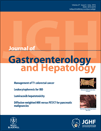
JOURNAL OF GASTROENTEROLOGY AND HEPATOLOGY
Elevating standards in gastrointestinal and liver disease research.Welcome to the JOURNAL OF GASTROENTEROLOGY AND HEPATOLOGY, an esteemed publication in the field of gastroenterology and hepatology, proudly published by WILEY. Established in 1986, this journal serves as a crucial platform for researchers, healthcare professionals, and students, presenting groundbreaking research and comprehensive reviews that drive advances in understanding and treating gastrointestinal and liver diseases. With a strong reputation evidenced by its Q1 ranking in gastroenterology and Q2 ranking in hepatology, this journal ranks impressively in the Scopus metrics - positioned at #22 out of 167 in gastroenterology and #21 out of 82 in hepatology, reflecting its contribution to scholarly excellence. Although it does not offer open access options, the journal’s rich archive and diverse topics make it indispensable for those dedicated to improving patient outcomes in these critical areas of medicine. Whether you are a seasoned researcher or an aspiring medical professional, engaging with this journal will keep you at the forefront of the latest developments and emerging trends in gastroenterology and hepatology research.
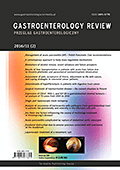
Gastroenterology Review-Przeglad Gastroenterologiczny
Bridging Research and Practice in GastroenterologyGastroenterology Review-Przeglad Gastroenterologiczny is a premier, peer-reviewed journal published by TERMEDIA PUBLISHING HOUSE LTD, focusing on the dynamic field of gastroenterology. Since its inception in 2006, it has embraced an Open Access model, ensuring that the latest research is readily accessible to a global audience, fostering collaboration and innovation. Based in Poland, this journal serves as a crucial platform for disseminating significant findings in gastrointestinal research, with a current Scopus rank placing it at the 39th percentile in its category. With a commitment to advancing the understanding of gastroenterological conditions, *Gastroenterology Review* publishes original articles, reviews, and case studies that contribute to both clinical practice and academic research. The journal is particularly aimed at researchers, healthcare professionals, and students who ignite dialogues that shape the future of gastrointestinal health. Explore the comprehensive insights that this journal offers, as it encapsulates vital developments from 2008 to 2024 in the ever-evolving landscape of gastroenterology.

Indian Journal of Gastroenterology
Bridging Research and Practice in Gastrointestinal HealthThe Indian Journal of Gastroenterology, a prominent publication in the field of gastroenterology, is published by Springer India. With roots dating back to 1982 and an ongoing commitment to disseminating high-quality research, this journal serves as a vital platform for researchers, practitioners, and students interested in gastrointestinal health and diseases. It boasts an impressive track record with a Scopus rank of #82 in the gastroenterology category and a 2023 quartile ranking of Q3, firmly situating it within the competitive landscape of medical journals. Although it is not an open-access journal, the Indian Journal of Gastroenterology offers accessible research articles contributing significantly to the field, facilitating informed discussion and advancing knowledge in gastrointestinal medicine. The journal's comprehensive focus covers a wide range of topics from clinical studies to innovative therapeutic approaches, ensuring its relevance to current medical practices and the evolving challenges in gastroenterology.

Frontline Gastroenterology
Pioneering Research for Liver and Gut HealthFrontline Gastroenterology is a leading academic journal published by the BMJ Publishing Group that plays a vital role in advancing the field of gastroenterology and hepatology. Established in 2013, this prestigious journal has established itself as a significant resource for researchers, healthcare professionals, and students alike, maintaining a commendable impact factor and consistently achieving a Q2 ranking in both gastroenterology and hepatology categories as of 2023. With its focus on disseminating high-quality, peer-reviewed research, Frontline Gastroenterology covers a wide scope of topics pertinent to the understanding, diagnosis, and treatment of gastrointestinal and liver diseases. Although it does not offer Open Access options, its content is accessible through various institutional and personal subscriptions, ensuring that critical findings reach an international audience. As the journal continues to converge into the future, it remains dedicated to fostering innovation and dialogue in gastroenterological sciences.

GUT
Advancing the Frontiers of Gastrointestinal ScienceGUT is a premier journal in the field of gastroenterology, published by the esteemed BMJ Publishing Group. With a rich history dating back to 1960 and an impressive convergence of research expected to continue through 2024, GUT has established itself as a cornerstone of academic discourse in the gastrointestinal sciences. The journal boasts a remarkable impact factor, positioning it in the Q1 category for gastroenterology with an outstanding rank of #3 out of 167 in its Scopus ranking, reflecting its 98th percentile status among peers. Although it does not currently offer open access options, GUT remains dedicated to disseminating high-quality research, reviews, and clinical studies that advance the understanding of digestive health. Published in the United Kingdom, GUT serves as an essential resource for researchers, clinicians, and students aiming to stay at the forefront of innovations and developments in the field.
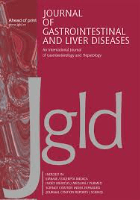
Journal of Gastrointestinal and Liver Diseases
Pioneering Insights for a Healthier Digestive SystemThe Journal of Gastrointestinal and Liver Diseases, published by MEDICAL UNIV PRESS in Romania, serves as a pivotal platform for the dissemination of significant research in the fields of gastroenterology and hepatology. Established in 2006, this journal has evolved over the years, currently holding a Q3 rank in Gastroenterology and a Q2 rank in Medicine (miscellaneous), reflecting its commitment to high-quality scholarship and impactful contributions to medical science.
With an ISSN of 1841-8724 and an E-ISSN of 1842-1121, the journal engages a diverse readership of researchers, clinicians, and students passionate about advancing knowledge in gastrointestinal and liver health. While it currently does not operate under an open access model, the journal remains a vital resource for those seeking to stay updated on the latest developments and emerging trends in the field. As it converges towards a broader impact, projected through its coverage until 2024, the Journal of Gastrointestinal and Liver Diseases continues to contribute to the academic landscape, encouraging innovation and comprehensive understanding in digestive health.
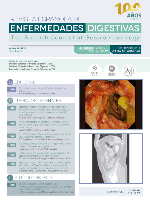
REVISTA ESPANOLA DE ENFERMEDADES DIGESTIVAS
Unveiling insights into digestive diseases.REVISTA ESPANOLA DE ENFERMEDADES DIGESTIVAS, a pivotal Open Access journal published by ARAN EDICIONES, S A, has been at the forefront of advancing the field of gastroenterology since its inception in 1990. With a robust commitment to disseminating high-quality research, the journal provides a platform for researchers, clinicians, and students to share innovative findings and insights concerning digestive diseases. The journal is characterized by its Q3 ranking in both Gastroenterology and Miscellaneous Medicine categories, indicative of its significant contributions to these fields, and is positioned within the 36th percentile of Scopus rankings for medicine related to gastroenterology. Based in Spain, REVISTA ESPANOLA DE ENFERMEDADES DIGESTIVAS has embraced the Open Access model since 2004, ensuring that its articles are readily available to a global audience without financial barriers. The journal not only supports academic discourse but also plays a crucial role in improving clinical practices and health outcomes related to digestive health.
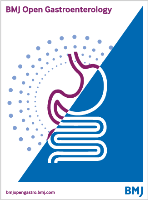
BMJ Open Gastroenterology
Leading the Way in Innovative Gastroenterological ResearchBMJ Open Gastroenterology is a premier open access journal published by the esteemed BMJ Publishing Group, focusing on the dynamic and evolving field of gastroenterology. Established in 2014, the journal has rapidly ascended in stature, reflected in its impressive 2023 Q1 ranking in gastroenterology and its position within the top 25% of journals in the category according to Scopus. With a mission to disseminate high-quality, peer-reviewed research with global significance, the journal provides a vital platform for researchers, professionals, and students alike to share their findings and advancements in gastrointestinal medicine. Operating from its headquarters in London, England, the journal's open access format ensures wide visibility and accessibility of cutting-edge research, making it an invaluable resource for those dedicated to improving patient care and driving innovation in gastroenterological sciences. By engaging with this journal, contributors and readers can stay at the forefront of critical developments in the field, fostering a collaborative environment for knowledge exchange.